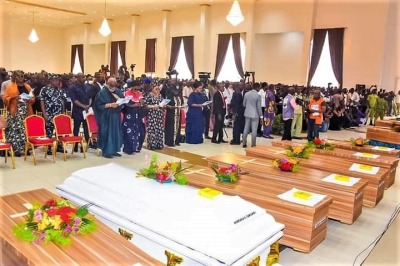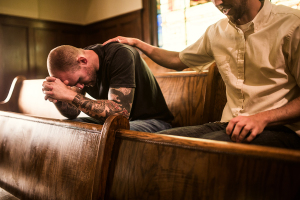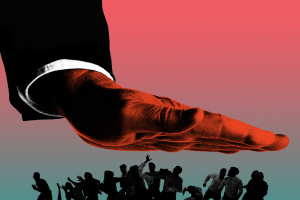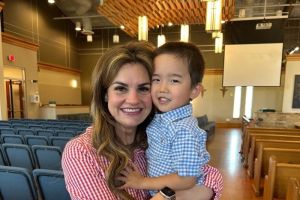Most deadly country to be Christian (Hint: Not Afghanistan)

The deadliest country in the world for Christians isn’t Afghanistan or North Korea, it’s Nigeria.
Last year, 5,621 Christians were killed worldwide because of their faith — 90% of them were northern Nigerians.
Mission organizations are reporting that Christian persecution is at its highest in 30 years. And that’s primarily because of what’s been happening in northern Nigeria over the last 24 years.
Approximately half of Nigeria’s population are professing Christians, and most of them live in the south. However the other half are Muslims, and most of them live in the north.
Northern Nigeria is where Boko Haram, an Islamic terrorist group, has kidnapped thousands of young girls and killed tens of thousands of people over the last decade. But Boko Haram is enabled by northern Nigeria’s Sharia laws. There’s a direct relationship between terrorism and Sharia Law in Nigeria.
Boko Haram was founded in northern Nigeria in 2002, shortly after 12 northern states reintroduced Sharia law between 1999 and 2001 — despite Nigerians’ constitutional right to religious freedom. Since then, at least 50,000 Christians in northern Nigeria have been murdered.
And it’s actually getting worse. Last year was the deadliest year for Christians in Nigeria. Sharia blasphemy laws, terrorist attacks, and mob violence killed at least 5,000 Christians last year.
One of these Christians was Deborah Samuel. She was a student at a university in Sokoto State, northern Nigeria. She was killed at her school because she praised Jesus for her academic success.
On May 12, 2022, a classmate asked Deborah in a WhatsApp group for their class how she passed a recent exam. She answered, “Jesus.” According to some of her classmates, that answer is a crime worthy of death.
Some of her classmates replied with Islamic statements and demanded that she should retract her words about Jesus. But she refused. Instead, she defended her Christian beliefs.
Immediately the Muslim students said she was guilty of blasphemy under Sokoto State’s Sharia law, which is punishable by death. So they called on others in the community to execute mob justice.
School security tried to protect Deborah, but they were overpowered by the mob. Police officers were called, but they were supposedly intimidated by the large crowd. The mob threatened to kill anyone who tried to help her, so the rest of the Christian students fled the scene and returned home for their own safety.
Deborah, however, didn’t get the opportunity to return home to her parents.
The mob found her hiding in a security room. They dragged her outside, and yelling “Allahu akbar,” her classmates and other residents in the community — including elderly women — beat her with large sticks, stoned her, and dumped tires and gasoline on her body, and burned her to death.
In response to her murder, Nigeria’s incumbent president, Muhammadu Buhari, said:
“Muslims all over the world demand respect for the Holy Prophets … but where transgressions occur, as alleged to be the case in this instance, the law does not allow anyone to take matters into their hands.”
In other words, according to the president, the only problem with her murder is that she was killed by a mob, instead of local authorities.
Unsurprisingly, the president is from a northern state that enforces Sharia law. In 2001, he said:
“I will continue to show openly and inside me the total commitment to the Sharia movement that is sweeping all over Nigeria. God-willing, we will not stop the agitation for the total implementation of the Sharia all over the country.”
Nevertheless, though you and I didn’t have the opportunity to save Deborah’s life — right now, we have the opportunity to save another person’s life. And if we save that person’s life, it could save the lives of thousands of Christians in Nigeria.
Like Deborah Samuel, another young person in northern Nigeria has been sentenced to death over allegedly “blasphemous” messages on WhatsApp.
Yahaya Sharif-Aminu is a singer-songwriter in his early 20s. He’s a Sufi Muslim, making him a religious minority in northern Nigeria’s mostly Sunni population. He shared some of his songs in a WhatsApp group in 2020. Some of the members in the WhatsApp group, however, accused Yahaya of committing “blasphemy” against the “prophet” Muhammad.
Soon a mob surrounded his family’s home and burned it down. Police officers subsequently arrested Yahaya and he was convicted under Sharia court — without legal counsel — to death by hanging.
By the grace of God, Alliance Defending Freedom International is supporting Yahaya. After 3 years of suffering in prison, he’s appealed his death sentence, and his case will be decided at the Supreme Court of Nigeria.
Northern Nigeria’s blasphemy laws violate international human rights and they’re inconsistent with all Nigerian’s constitutional right to religious freedom. If Yahaya wins his case, not only would it save his life, but it could also abolish blasphemy laws in northern Nigeria.
Though he’s a Sufi Muslim, his case could be the deciding factor in how many more Nigerian Christians will be killed for their faith. This case could prevent the deaths of tens of thousands of Christians in Nigeria. And since Nigeria is one of Africa’s most influential nations, if Yahaya wins his case, it could also lead to the end of Sharia law in other African nations.
So as the Bible says, “Remember those who are in prison, as though in prison with them, and those who are mistreated, since you also are in the body” (Hebrews 13:3).
I’m a Ghanaian with relatives in northern Nigeria. But the most important connection I have with Christians in northern Nigeria is the same connection you have with them: we are members of the same body.
Therefore blasphemy laws aren’t just persecuting Christians in northern Nigeria, they’re persecuting Christ, they’re persecuting the body of Christ — they’re persecuting the Church as a whole. They’re persecuting our family.
So brothers and sisters, please remember our other brothers and sisters in northern Nigeria. Please pray for them. And please donate to Alliance Defending Freedom International, so they can support Yahaya’s case before the Supreme Court of Nigeria.
Your donation could save Yahaya’s life and the lives of thousands of Christians in Nigeria.
You can donate here.
Originally published at Slow to Write.
Samuel Sey is a Ghanaian-Canadian who lives in Brampton, a city just outside of Toronto. He is committed to addressing racial, cultural, and political issues with biblical theology, and always attempts to be quick to listen and slow to speak.



























